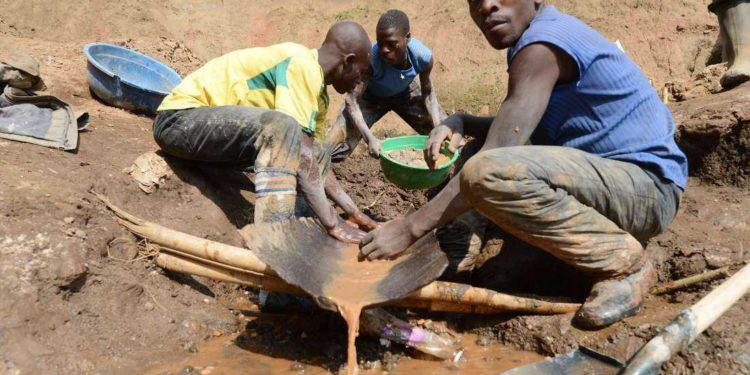A panel of experts briefed a Catholic Social Ministry gathering in Washington on Catholic Church’s response in the African nation
Men separate minerals from rock and sand on May 28, 2013, near the Mudere mine, outside Rubaya, some 9 km from the eastern Democratic Republic of Congo city of Goma. (Photo: AFP)
When Pope Francis’ airplane touched down at N’djili International Airport in Congo’s capital, Kinshasa, on Jan. 31, he became the first pontiff to visit since St. John Paul II’s 1985 apostolic journey.
Today, the mineral-rich African nation is no longer known as Zaire, and evangelical churches now thrive in the traditionally Catholic country. But two things have remained discouragingly the same: Congo is still characterized by extreme poverty and violent armed conflict — twin conditions fueled in part by the consumer demands of economically advanced countries.
A Jan. 30 panel of experts at the 2023 Catholic Social Ministry Gathering in Washington briefed participants on the causes of unrest in Congo, how the Catholic Church there is responding and how Americans can help.


“We’re going from the internal combustion engine age to the EV age,” said Stephen Hilbert, referencing the auto industry shift from conventional gas-powered autos to electric vehicles, or EVs. Hilbert is foreign policy adviser for Africa and Global Development in the U.S. Conference of Catholic Bishops’ Department of Justice, Peace and Human Development.
This evolution is painfully relevant to Congo because almost half of the world’s cobalt reserves are within its borders. Cobalt is used in electric car batteries, computers and cellphones.
By 2026, Hilbert said, more than half of new U.S. cars sold are expected to be electric. In 2022, the number of EVs sold in America increased 65% from 2021. “We are on a steeply rising curve when it comes to EVs,” explained Hilbert. “This is exploding … this is going to be a radical change.”
“Basically, right from independence, Congo was in conflict,” said Charles Cater, deputy director of Illicit Finance Policy at The Sentry, an investigative policy organization. “And that conflict, at least in part, also had to do with mining resources … and certainly Western interest in those resources.”
While the United Nations has kept a continuous peacekeeping presence, Congo wars, including the multi-nation Second Congo War (1998-2003) that claimed 5.4 million lives, have been a gruesomely consistent occurrence for more than 60 years.
The Dodd-Frank Act, passed in 2010 by the U.S. Congress, contained a provision requiring “due diligence” of publicly listed American companies through supply chain inspections for tin, tungsten, tantalum and gold originating in Congo and neighboring countries. An annual report to the U.S. Securities and Exchange Commission is required.
While various factors limit wide-scale cobalt-related conflict, Cater said there are still serious issues. These include mine security, work safety, use of child labor and environmental impacts.
“Mining requires an incredible amount of electricity,” Cater noted. “And depending upon how you generate the electricity, you may have a massive carbon footprint.” Ironically, he said, “if you are using a coal-fired plant to generate electricity to mine cobalt to make electric vehicle batteries, there’s some built-in contradictions — and some ways in which this isn’t quite as green as we might have assumed.”
Suggesting actions, Cater said U.S. agencies can apply sanctions against “bad actors,” and prioritize corruption discussions in diplomatic activity. These mineral resources also might be mined in the U.S. Engineers are attempting to design batteries that won’t rely upon “conflict minerals,” and individual awareness and advocacy also are effective.
Robert Groelsema, team leader of the Africa Justice and Peacebuilding Working Group at Catholic Relief Services, said cobalt isn’t the only “conflict mineral” in the Congo. The metallic ore coltan — once reduced to tantalum powder — is integral to heat-resistant capacitors found in laptops, cellphones and other electronic devices. Almost 80% of Africa’s coltan resources are in Congo.
While valuable minerals drive conflict, they aren’t the fundamental cause, Groelsema explained. Instead, they “sustain or can exacerbate conflict, and can motivate people toward violence — but they’re probably not really the root causes of the conflict.” Land disputes and ethnic exclusion — as well as poor governance and unfair elections — all stir unrest and fighting.
While mediating this complex political and social situation is a considerable challenge, Groelsema said the Catholic Church in Congo is “setting an example as a civil society organization that provides checks and balances on the evil going on in the country.”
In 2019, the Congo bishops’ conference stationed 40,000 presidential election monitors at polling stations in an attempt to avoid fraud and violence.
Groelsema shared a statement from Henri Muhiya, executive secretary of CERN-CENCO; CENCO is the Congo’s national assembly of bishops, while CERN monitors natural resource exploitation issues.
“Let American Catholics know,” Muhiya said, “that they have a duty of solidarity as Christians.” Elected officials and corporations must be held responsible, he urged. Stressing global interconnectedness, Muhiya cautioned that what harms Congo can ripple worldwide. “It is time,” Muhiya declared, “to act for justice for the Congolese people.”
Latest News
Credit: Source link




